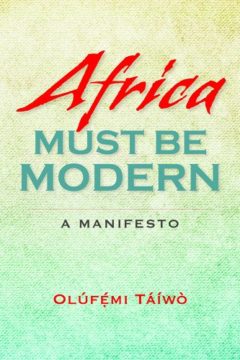Andy Lamey at The Point:
 Táíwò is a fearless and original thinker and, at times, a polemical one. To be sure, Táíwò in his ferocious mode is often witty (one chapter is called “Decolonise This!”) and scores some tidy hits, though sometimes Táíwò lets his polemical gifts carry him too far. (“Here is the deal,” he writes, “the world, the so-called West or Global North, does not owe Africa”—overlooking the many obstacles to African development, such as heavy-handed interventions in African economies by Western-dominated entities like the World Bank, and subsidies to Western farmers that price out their African counterparts.) But Táíwò’s excesses should not overshadow his insights. These are especially on display in his less scathing moments, in which he comes not to destroy decolonization but to take it over, by channeling its liberationist energies in a more productive direction. The race-based account of writers such as Mills, Táíwò points out, is complicated by colonialism’s white subjects—the Irish, Québécois and Afrikaners, for example. Many discussions of colonialism in Africa also pass over in silence what Táíwò terms “the single outstanding colonial issue in the continent,” the occupation of Western Sahara, which has been ongoing since 1975, and which features an African aggressor, Morocco. The fact that most African borders were originally drawn by colonial powers is often cited as evidence of colonialism’s ongoing presence. Táíwò counters that countries such as Nigeria, Cameroon, South Sudan and Eritrea have redrawn national borders since the colonial period, suggesting that the continent’s current borders also reflect African influence.
Táíwò is a fearless and original thinker and, at times, a polemical one. To be sure, Táíwò in his ferocious mode is often witty (one chapter is called “Decolonise This!”) and scores some tidy hits, though sometimes Táíwò lets his polemical gifts carry him too far. (“Here is the deal,” he writes, “the world, the so-called West or Global North, does not owe Africa”—overlooking the many obstacles to African development, such as heavy-handed interventions in African economies by Western-dominated entities like the World Bank, and subsidies to Western farmers that price out their African counterparts.) But Táíwò’s excesses should not overshadow his insights. These are especially on display in his less scathing moments, in which he comes not to destroy decolonization but to take it over, by channeling its liberationist energies in a more productive direction. The race-based account of writers such as Mills, Táíwò points out, is complicated by colonialism’s white subjects—the Irish, Québécois and Afrikaners, for example. Many discussions of colonialism in Africa also pass over in silence what Táíwò terms “the single outstanding colonial issue in the continent,” the occupation of Western Sahara, which has been ongoing since 1975, and which features an African aggressor, Morocco. The fact that most African borders were originally drawn by colonial powers is often cited as evidence of colonialism’s ongoing presence. Táíwò counters that countries such as Nigeria, Cameroon, South Sudan and Eritrea have redrawn national borders since the colonial period, suggesting that the continent’s current borders also reflect African influence.
more here.
